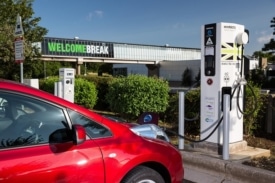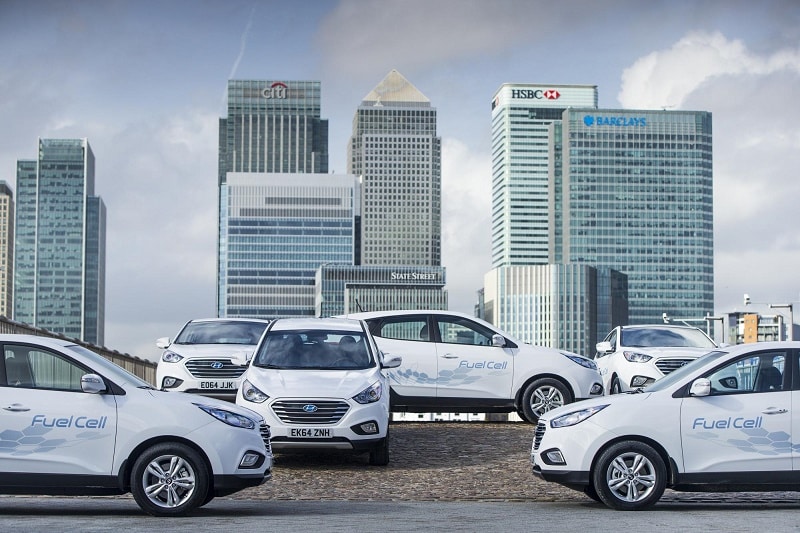The grant was created in 2011 to encourage sales of ultra-low emission vehicles (ULEVs) and has been instrumental in the UK becoming the biggest ULEV market in the EU, and the fourth largest in the world. Some 50,000 people have already benefited from the grant.

From 1 March 2016, two grant rates will be available to ensure the funding is sustainable and focus financial support on the greenest vehicles. ‘Category 1’ vehicles with a zero emission range of over 70 miles will benefit from a grant of £4,500.
‘Category 2 and 3’ vehicles with a shorter zero emission range – such as plug-in hybrid vehicles with a petrol or diesel engine – will receive £2,500.
The new grant levels reflect strong growth in the sector with sales of ULEVs doubling over the past year. Motorists also have a wider choice of 29 ULEVs on the market – five times as many as when the plug-in car grant was launched.
The UK is also at the forefront of the roll-out of hydrogen fuel cell vehicles, which are also eligible for the £4,500 grant thanks to their zero tailpipe emissions.
The plug-in car grant is just one element of a comprehensive £600 million package of measures from the Office for Low Emission Vehicles over the course of this parliament which also includes funding for chargepoints, grants encouraging low emission buses and taxis and R&D funding for innovative technology such as lighter vehicles and longer-lasting car batteries.
The government has committed to make nearly all cars and vans in the UK zero emission by 2050, and announced in the Spending Review to increase funding to £600 million between 2015 and 2020 to support the development, manufacture and uptake of ULEVs.
This commitment was reinforced when the UK was one of 14 international members of the Zero Emission Vehicle Alliance to sign a pledge promoting the uptake of electric cars at the recent Paris climate conference.
Aid cut for home chargers criticised
From 1 March 2016, the electric vehicle homecharge scheme (EVHS) will be cut again to offer £500 per installation, on average covering half the cost of getting a charge point. It had been £1,000, reduced to £900 and 75% of installation costs in June 2014.
David Martell, CEO of Chargemaster, the largest provider and operator of charging points in the UK, criticised the reduced grant aid for installing home chargers for electric vehicles.
He called it “premature and a step backwards for UK carbon reduction and the necessary push towards air quality improvement”.
He added: “It means that many plug in hybrid vehicle drivers will simply not bother fitting a charger at home and run their cars on fossil fuel instead. To get the full benefit of owning an EV, a homecharger is vital.”
“Support for home charging offers much better value for money than many other areas that OLEV spends its resources on. It is also most regrettable that this change has been made giving little more than two months’ notice.”
“Until now, UK government has led the way in supporting charging at home. This move is difficult to understand when the market is still fragile and only just starting to gain momentum.
“It is even more surprising considering government’s recent announcement that it will allocate £600m to support ultra-low emission vehicles over the next six years. To reduce its annual support for charging at home from £12m to £7.5m is unfortunate at this stage of the development of the market.”
Welcomed by Go Ultra Low Campaign
The collaborative Go Ultra Low campaign is the first of its kind, bringing together a consortium of seven leading vehicle manufacturers – Audi, BMW, Mitsubishi, Nissan, Renault, Toyota and Volkswagen – government and the Society of Motor Manufacturers and Traders.
Its head Poppy Welch said: “The new Plug-in Car Grant secures more funding for a greater number of plug-in car buyers, continuing the rapid growth of the UK’s electric vehicle market.
“The new grant levels reflect the lower purchase price of these vehicles and remains an excellent purchase incentive for motorists embracing this new, green technology.
“When you consider the ‘in-life’ costs savings associated with plug-in car ownership – such as lower tax, fuel and maintenance – the electric vehicle proposition is extremely attractive.”








